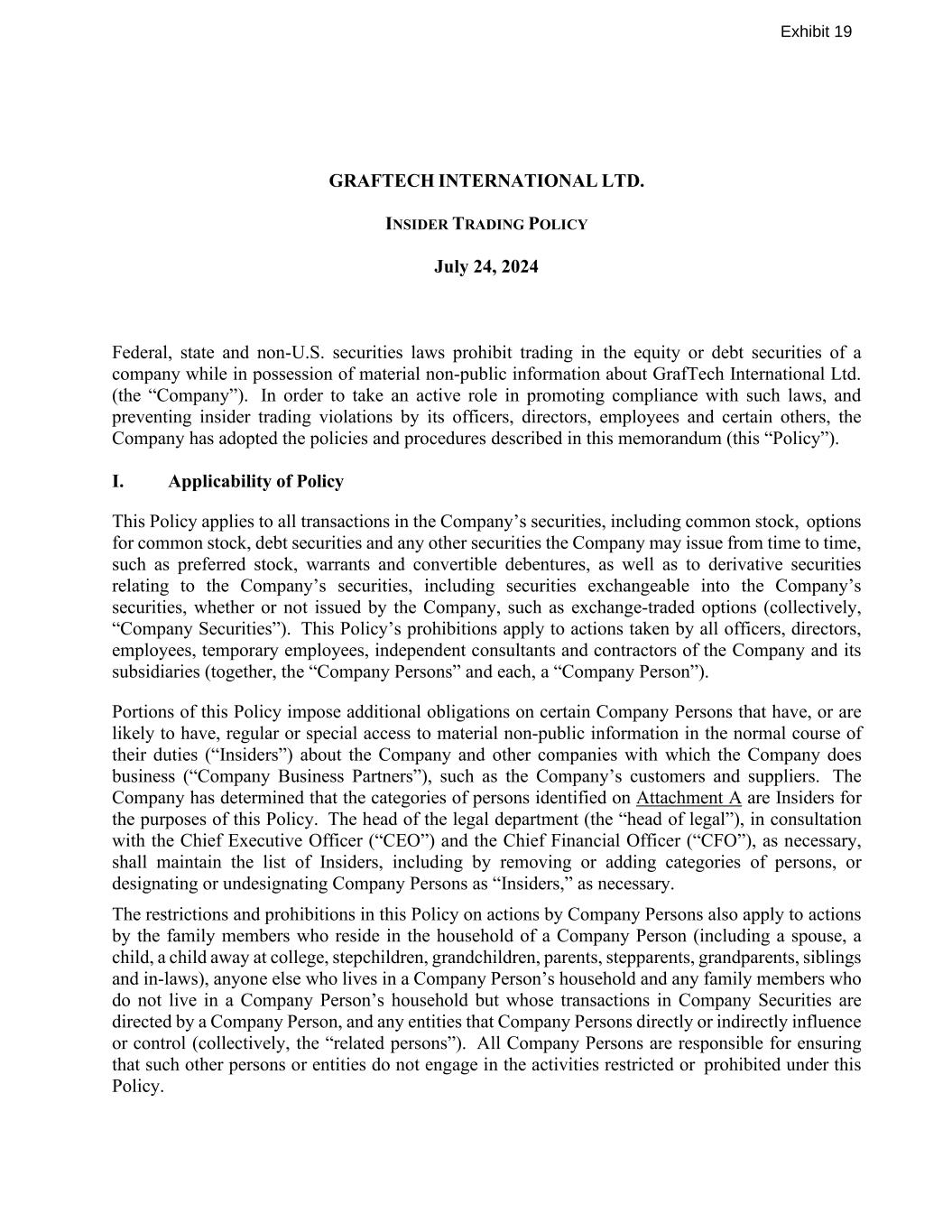
GRAFTECH INTERNATIONAL LTD. INSIDER TRADING POLICY July 24, 2024 Federal, state and non-U.S. securities laws prohibit trading in the equity or debt securities of a company while in possession of material non-public information about GrafTech International Ltd. (the “Company”). In order to take an active role in promoting compliance with such laws, and preventing insider trading violations by its officers, directors, employees and certain others, the Company has adopted the policies and procedures described in this memorandum (this “Policy”). I. Applicability of Policy This Policy applies to all transactions in the Company’s securities, including common stock, options for common stock, debt securities and any other securities the Company may issue from time to time, such as preferred stock, warrants and convertible debentures, as well as to derivative securities relating to the Company’s securities, including securities exchangeable into the Company’s securities, whether or not issued by the Company, such as exchange-traded options (collectively, “Company Securities”). This Policy’s prohibitions apply to actions taken by all officers, directors, employees, temporary employees, independent consultants and contractors of the Company and its subsidiaries (together, the “Company Persons” and each, a “Company Person”). Portions of this Policy impose additional obligations on certain Company Persons that have, or are likely to have, regular or special access to material non-public information in the normal course of their duties (“Insiders”) about the Company and other companies with which the Company does business (“Company Business Partners”), such as the Company’s customers and suppliers. The Company has determined that the categories of persons identified on Attachment A are Insiders for the purposes of this Policy. The head of the legal department (the “head of legal”), in consultation with the Chief Executive Officer (“CEO”) and the Chief Financial Officer (“CFO”), as necessary, shall maintain the list of Insiders, including by removing or adding categories of persons, or designating or undesignating Company Persons as “Insiders,” as necessary. The restrictions and prohibitions in this Policy on actions by Company Persons also apply to actions by the family members who reside in the household of a Company Person (including a spouse, a child, a child away at college, stepchildren, grandchildren, parents, stepparents, grandparents, siblings and in-laws), anyone else who lives in a Company Person’s household and any family members who do not live in a Company Person’s household but whose transactions in Company Securities are directed by a Company Person, and any entities that Company Persons directly or indirectly influence or control (collectively, the “related persons”). All Company Persons are responsible for ensuring that such other persons or entities do not engage in the activities restricted or prohibited under this Policy.

2 This Policy (and/or a summary thereof) shall be delivered to all new Company Persons upon the commencement of their relationships with the Company or its subsidiaries and is to be circulated to all Company Persons at least annually. II. Statement of Policy General Prohibition Against Insider Trading No Trading on or Tipping of Material Non-Public Information No Company Person may, while in possession of material non-public information about the Company: • buy, sell or otherwise engage in any transactions, directly or indirectly, in any Company Securities, except as described in the “Certain Exceptions” section below or as may be permitted pursuant to a Rule 10b5-1 plan (see Annex 2 to this Policy); • make recommendations or express opinions about trading in Company Securities on the basis of such information; • disclose such information to any third party, including family or household members; • make gifts, charitable contributions or other contributions of Company Securities; or • assist anyone in the above activities. A Company Person may also come into contact with material non-public information relating to a Company Business Partner in the course of their employment with, or other services performed on behalf of, the Company or any subsidiary of the Company, or otherwise. The above restrictions apply equally to such Company Business Partners while in possession of material non-public information relating to such Company Business Partner. Transactions that may be necessary or justifiable for independent reasons (such as the need to raise money for an emergency expenditure) are not excepted from these restrictions. Applicable securities laws do not recognize mitigating circumstances and, in any event, even the appearance of an improper transaction must be avoided to preserve the Company’s reputation for adhering to the highest standards of conduct. “Material Non-Public Information” Material Information. It is not possible to define all categories of material information, as the ultimate determination of materiality by enforcement authorities will be based on an assessment of all of the facts and circumstances after the fact. Information that is material at one point in time may cease to be material at another point in time, and vice versa. In general, information is considered “material” if there is a reasonable likelihood that it would be considered important to an investor in making a decision to buy, hold or sell securities. Any information that could be expected to affect a company’s stock price, whether positive or negative, and whether the change is large or small, may be considered material.
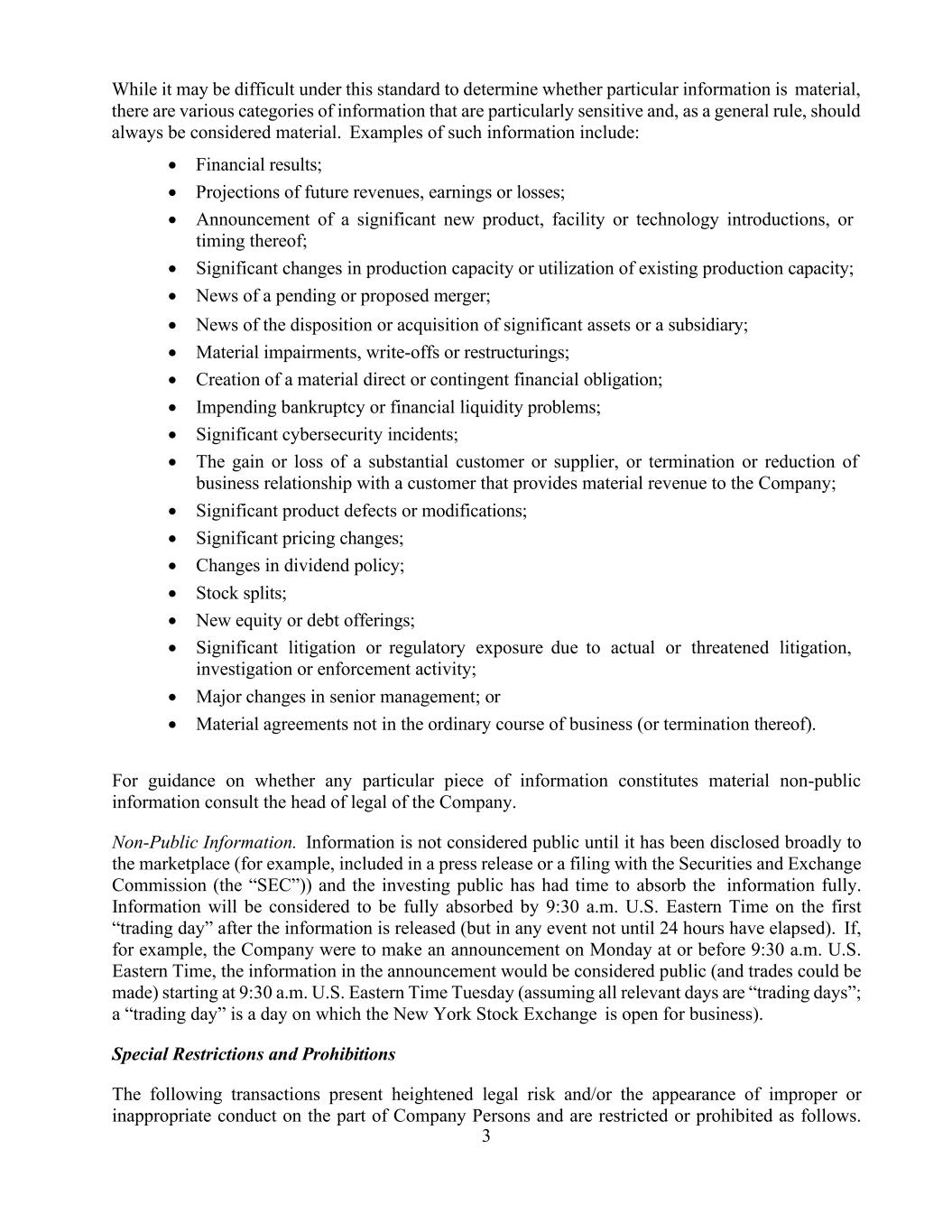
3 While it may be difficult under this standard to determine whether particular information is material, there are various categories of information that are particularly sensitive and, as a general rule, should always be considered material. Examples of such information include: • Financial results; • Projections of future revenues, earnings or losses; • Announcement of a significant new product, facility or technology introductions, or timing thereof; • Significant changes in production capacity or utilization of existing production capacity; • News of a pending or proposed merger; • News of the disposition or acquisition of significant assets or a subsidiary; • Material impairments, write-offs or restructurings; • Creation of a material direct or contingent financial obligation; • Impending bankruptcy or financial liquidity problems; • Significant cybersecurity incidents; • The gain or loss of a substantial customer or supplier, or termination or reduction of business relationship with a customer that provides material revenue to the Company; • Significant product defects or modifications; • Significant pricing changes; • Changes in dividend policy; • Stock splits; • New equity or debt offerings; • Significant litigation or regulatory exposure due to actual or threatened litigation, investigation or enforcement activity; • Major changes in senior management; or • Material agreements not in the ordinary course of business (or termination thereof). For guidance on whether any particular piece of information constitutes material non-public information consult the head of legal of the Company. Non-Public Information. Information is not considered public until it has been disclosed broadly to the marketplace (for example, included in a press release or a filing with the Securities and Exchange Commission (the “SEC”)) and the investing public has had time to absorb the information fully. Information will be considered to be fully absorbed by 9:30 a.m. U.S. Eastern Time on the first “trading day” after the information is released (but in any event not until 24 hours have elapsed). If, for example, the Company were to make an announcement on Monday at or before 9:30 a.m. U.S. Eastern Time, the information in the announcement would be considered public (and trades could be made) starting at 9:30 a.m. U.S. Eastern Time Tuesday (assuming all relevant days are “trading days”; a “trading day” is a day on which the New York Stock Exchange is open for business). Special Restrictions and Prohibitions The following transactions present heightened legal risk and/or the appearance of improper or inappropriate conduct on the part of Company Persons and are restricted or prohibited as follows.

4 The restrictions and prohibitions apply even if the relevant Company Person is not in possession of material non-public information. Short Sales Short sales of a security (i.e., the sale of a security that the seller does not own) by their nature reflect an expectation that the value of the security will decline. Short sales can create perverse incentives for the seller, and signal to the market a lack of confidence in the Company’s prospects. Accordingly, no Company Person may engage in a short sale of Company Securities. Publicly Traded Options A put is an option to sell a security at a specific price before a set date, and a call is an option or right to buy a security at a specific price before a set date. Generally, put options are purchased when a person believes the value of a security will fall, and call options are purchased when a person believes the value of a security will rise. A transaction in options is, in effect, a bet on the short-term movement of the Company’s securities, and therefore creates the appearance of trading on the basis of material non-public information. Transactions in options may also focus a Company Person’s attention on short-term performance at the expense of the Company’s long-term objectives. Accordingly, no Company Person may engage in a put, call or other derivative security transaction relating to Company Securities on an exchange or in any other organized market. Hedging Transactions Certain forms of hedging or monetization transactions, including zero-cost collars, equity swaps, exchange funds and forward sale contracts, allow a stockholder to lock in much of the value of his or her stock holdings, often in exchange for all or part of the potential for upside appreciation in the stock. These transactions allow the stockholder to continue to own the covered securities, but without the full risks and rewards of ownership. Because participating in these transactions may cause a Company Person to no longer have the same objectives as the Company’s other stockholders, no Company Person may engage in such transactions. Pledging Transactions Company Persons may not pledge Company Securities as collateral for a loan or other obligation, or hold Company Securities in a margin account. An exception to the prohibition on pledging may be granted by the head of legal where a person wishes to pledge Company Securities as collateral for a loan (not including margin debt) and clearly demonstrates the financial capacity to repay the loan without resort to the pledged securities. If you would like to discuss the possible pledge of Company Securities, please contact the head of legal. Blackout Periods The Company has established quarterly blackout periods, and may impose additional, special blackout periods, each as described below. The absence of a blackout, however, does not mean trading is specifically permitted; an open trading window does not relieve you from the obligations to refrain from trading when in possession of material non-public information.
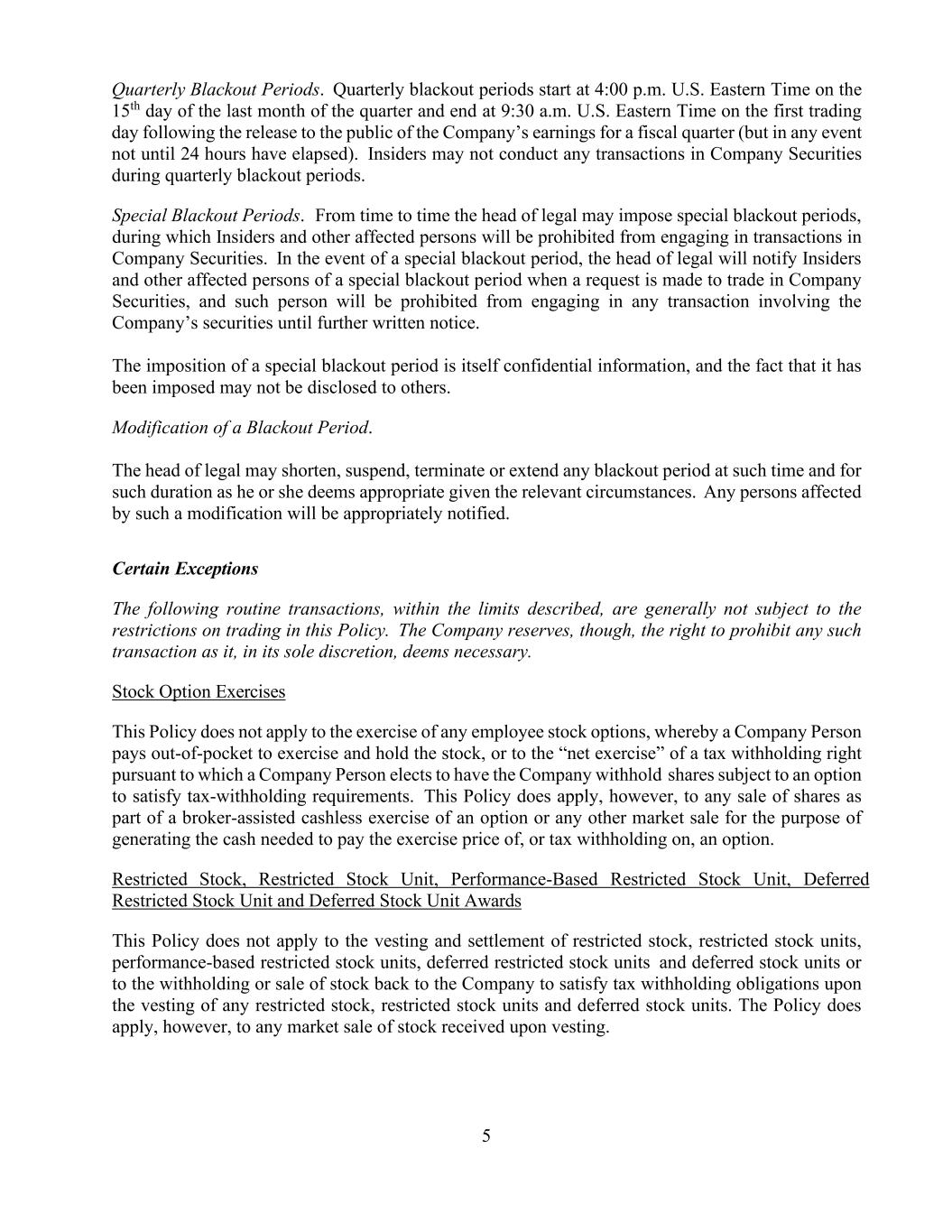
5 Quarterly Blackout Periods. Quarterly blackout periods start at 4:00 p.m. U.S. Eastern Time on the 15th day of the last month of the quarter and end at 9:30 a.m. U.S. Eastern Time on the first trading day following the release to the public of the Company’s earnings for a fiscal quarter (but in any event not until 24 hours have elapsed). Insiders may not conduct any transactions in Company Securities during quarterly blackout periods. Special Blackout Periods. From time to time the head of legal may impose special blackout periods, during which Insiders and other affected persons will be prohibited from engaging in transactions in Company Securities. In the event of a special blackout period, the head of legal will notify Insiders and other affected persons of a special blackout period when a request is made to trade in Company Securities, and such person will be prohibited from engaging in any transaction involving the Company’s securities until further written notice. The imposition of a special blackout period is itself confidential information, and the fact that it has been imposed may not be disclosed to others. Modification of a Blackout Period. The head of legal may shorten, suspend, terminate or extend any blackout period at such time and for such duration as he or she deems appropriate given the relevant circumstances. Any persons affected by such a modification will be appropriately notified. Certain Exceptions The following routine transactions, within the limits described, are generally not subject to the restrictions on trading in this Policy. The Company reserves, though, the right to prohibit any such transaction as it, in its sole discretion, deems necessary. Stock Option Exercises This Policy does not apply to the exercise of any employee stock options, whereby a Company Person pays out-of-pocket to exercise and hold the stock, or to the “net exercise” of a tax withholding right pursuant to which a Company Person elects to have the Company withhold shares subject to an option to satisfy tax-withholding requirements. This Policy does apply, however, to any sale of shares as part of a broker-assisted cashless exercise of an option or any other market sale for the purpose of generating the cash needed to pay the exercise price of, or tax withholding on, an option. Restricted Stock, Restricted Stock Unit, Performance-Based Restricted Stock Unit, Deferred Restricted Stock Unit and Deferred Stock Unit Awards This Policy does not apply to the vesting and settlement of restricted stock, restricted stock units, performance-based restricted stock units, deferred restricted stock units and deferred stock units or to the withholding or sale of stock back to the Company to satisfy tax withholding obligations upon the vesting of any restricted stock, restricted stock units and deferred stock units. The Policy does apply, however, to any market sale of stock received upon vesting.

6 Trades Executed Pursuant to a Rule 10b5-1 Plan The requirement for pre-clearance of trades, the quarterly trading restrictions and event-specific trading restrictions do not apply to transactions conducted pursuant to approved Rule 10b5-1 plans, described in Annex 2 to this Policy. However, entering into, amending or terminating a Rule 10b5-1 plan is subject to pre-clearance as described in Annex 2. Additional Procedures and Guidelines Pre-Clearance Insiders must obtain written pre-clearance from the legal department before transacting in Company Securities, including for transactions occurring outside a blackout period, any exercise of director or employee stock options and any gifts of Company Securities. A form for such purposes is provided as Attachment B. A request for pre-clearance should be submitted at least two days in advance of the proposed transaction. The legal department is under no obligation to approve any trade. Pre- clearance of any transaction is valid only for the shorter of 48 hours or a 13-trading hour period. For purposes of pre-clearance, trading hours are between 9:30 a.m. U.S. Eastern Time and 4:00 p.m. U.S. Eastern Time on trading days. If the transaction order is not placed within that period, pre-clearance must be requested and approved in writing again. Requesting persons must treat denials of pre- clearance requests as confidential. Further, pre- clearance approval from the Company does not relieve you from the obligations to refrain from trading when in possession of material non-public information. Section 16 of the Exchange Act Section 16 of the Securities Exchange Act of 1934, as amended (the “Exchange Act”) requires Directors and executive officers (“Section 16 Persons” and each, a “Section 16 Person”) to file with the SEC reports on designated forms (i.e., Forms 3, 4 and 5) as to their beneficial ownership of common stock and other equity securities (including derivatives) of the Company and to report purchases, sales and other changes in their ownership of such common stock and securities. Section 16 also requires Section 16 Persons to turn over to the Company any deemed profit on nonexempt purchases and sales or sales and purchases of such common stock and equity securities (including derivatives) that occur within 6 months of each other. A deemed profit can exist even if there was an actual loss or a tax loss. This deemed profit is commonly called “short-swing profit.” For purposes of Section 16, Section 16 Persons are treated as the beneficial owners of securities held by family members sharing their household. Grants, properly authorized by the Board of Directors (the “Board”) or committee of the Board, of stock options, restricted stock, restricted stock units, deferred stock units or other awards under the Company’s equity incentive plans are generally treated as exempt purchases that cannot be matched against any nonexempt sales but must still be reported. The exercise of a stock option or the vesting and settlement a restricted or deferred stock unit is not treated as a purchase, but also must be reported. If a Section 16 Person uses already owned stock to pay the exercise price of a stock option or has shares withheld to satisfy his or her tax withholding liabilities in connection with a stock option exercise or vesting and settlement of a restricted or deferred stock unit, the

7 disposition of the shares is exempt and cannot be matched against any nonexempt purchases. However, any sale of stock received upon exercise of a stock option or vesting and settlement of a restricted or deferred stock unit on the market will be a nonexempt sale and may be matchable with any nonexempt purchase occurring within six months before or after such sale. Similarly, purchases of stock pursuant to any broad-based employee stock purchase plan will generally be exempt, but any sales of stock received on the market will be nonexempt sales and may be matchable with any nonexempt purchase occurring within six months before or after such sale. If an executive officer exercises an option granted under the employee benefit plans and holds onto the stock received from the exercise (a “buy-hold” transaction), the executive officer has not made a “purchase.” When he or she eventually sells the stock received upon exercising the option, the sale of the stock is a “sale” for purposes of Section 16(b). If the executive officer exercises an option granted under the employee benefit plans and immediately sells the stock received from the exercise (a “buy-sell” transaction), he or she will have a “sale” but not a purchase. The exercise and cancellation of a stock appreciation right, performance unit or stock equivalent unit (whether or not the transaction also involves the related surrender and cancellation of a stock option) and the receipt of cash in complete or partial settlement of that right does not result in a “purchase” or “sale.” A sale on the open market of stock received under the employee benefit plans is a “sale” that can be matched against a “purchase.” Section 16 Persons should be aware that trading in Company stock under an approved Rule 10b5-1 plan does not exempt such transactions from the provisions of Section 16, including the reporting requirements. To ensure compliance with all reporting requirements, a Section 16 Person must, on the date of any trade, provide the legal department with all information relating to the trade that is necessary to properly prepare a Form 4. A Section 16 Person must also execute a Form 4 (either individually or through a duly-authorized power of attorney) within a sufficient amount of time to allow the legal department to electronically file the Form 4 with the SEC via EDGAR before the end of the second business day following the trade (10:00 p.m. U.S. Eastern Time). The preparation and filing of the Section 16 reporting forms ultimately is the responsibility of the relevant director or executive officer who is subject to these rules. The legal department will assist such person in preparing and filing such forms. Restrictions on Resales of Securities A director, executive officer or employee who owns Company Securities that are restricted (i.e., that were granted by or purchased from the Company without having first been registered with the SEC) may only sell those Company Securities pursuant to Rule 144 or an effective registration statement. A director or executive officer who owns Company Securities (even those purchased on the open market) may only sell them pursuant to Rule 144 or an effective registration statement.
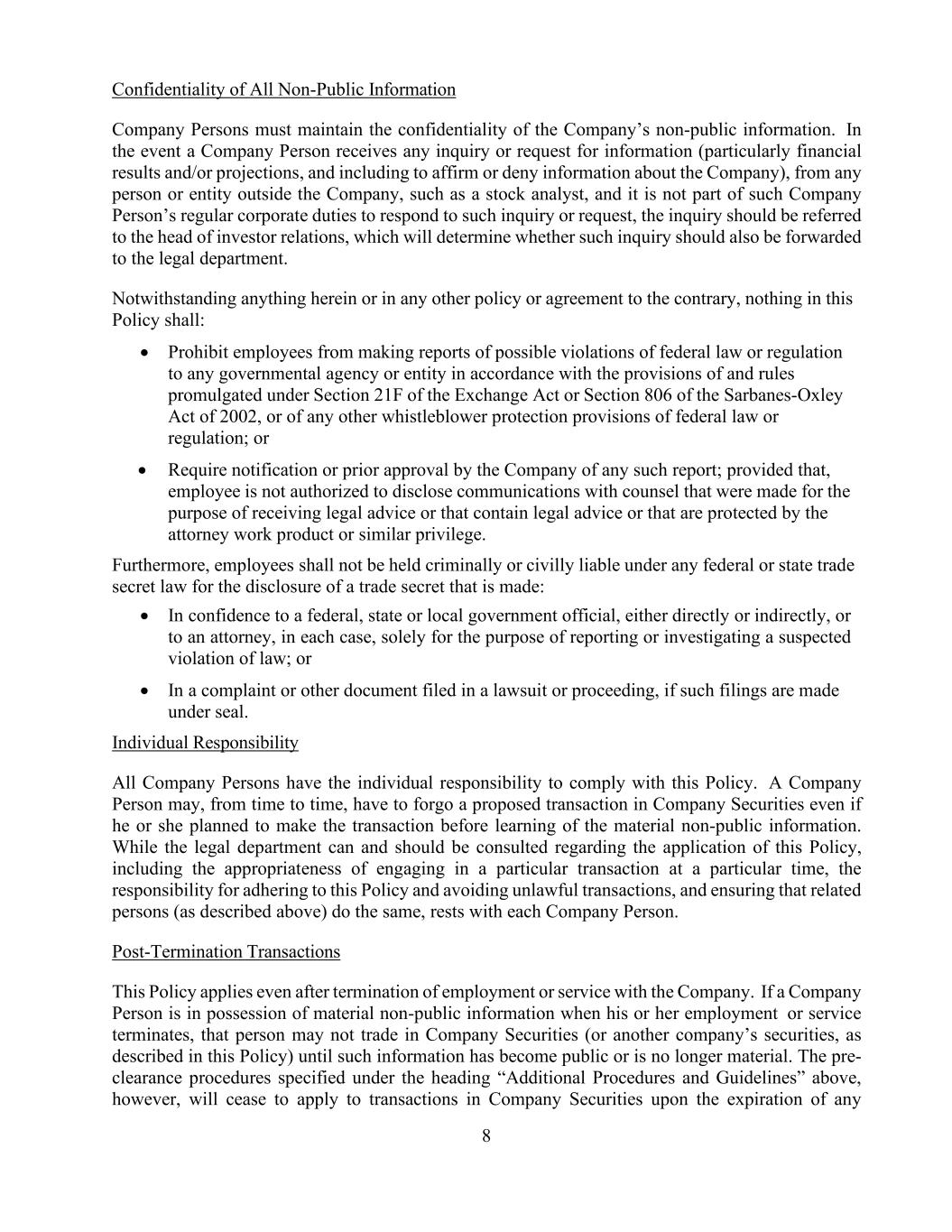
8 Confidentiality of All Non-Public Information Company Persons must maintain the confidentiality of the Company’s non-public information. In the event a Company Person receives any inquiry or request for information (particularly financial results and/or projections, and including to affirm or deny information about the Company), from any person or entity outside the Company, such as a stock analyst, and it is not part of such Company Person’s regular corporate duties to respond to such inquiry or request, the inquiry should be referred to the head of investor relations, which will determine whether such inquiry should also be forwarded to the legal department. Notwithstanding anything herein or in any other policy or agreement to the contrary, nothing in this Policy shall: • Prohibit employees from making reports of possible violations of federal law or regulation to any governmental agency or entity in accordance with the provisions of and rules promulgated under Section 21F of the Exchange Act or Section 806 of the Sarbanes-Oxley Act of 2002, or of any other whistleblower protection provisions of federal law or regulation; or • Require notification or prior approval by the Company of any such report; provided that, employee is not authorized to disclose communications with counsel that were made for the purpose of receiving legal advice or that contain legal advice or that are protected by the attorney work product or similar privilege. Furthermore, employees shall not be held criminally or civilly liable under any federal or state trade secret law for the disclosure of a trade secret that is made: • In confidence to a federal, state or local government official, either directly or indirectly, or to an attorney, in each case, solely for the purpose of reporting or investigating a suspected violation of law; or • In a complaint or other document filed in a lawsuit or proceeding, if such filings are made under seal. Individual Responsibility All Company Persons have the individual responsibility to comply with this Policy. A Company Person may, from time to time, have to forgo a proposed transaction in Company Securities even if he or she planned to make the transaction before learning of the material non-public information. While the legal department can and should be consulted regarding the application of this Policy, including the appropriateness of engaging in a particular transaction at a particular time, the responsibility for adhering to this Policy and avoiding unlawful transactions, and ensuring that related persons (as described above) do the same, rests with each Company Person. Post-Termination Transactions This Policy applies even after termination of employment or service with the Company. If a Company Person is in possession of material non-public information when his or her employment or service terminates, that person may not trade in Company Securities (or another company’s securities, as described in this Policy) until such information has become public or is no longer material. The pre- clearance procedures specified under the heading “Additional Procedures and Guidelines” above, however, will cease to apply to transactions in Company Securities upon the expiration of any
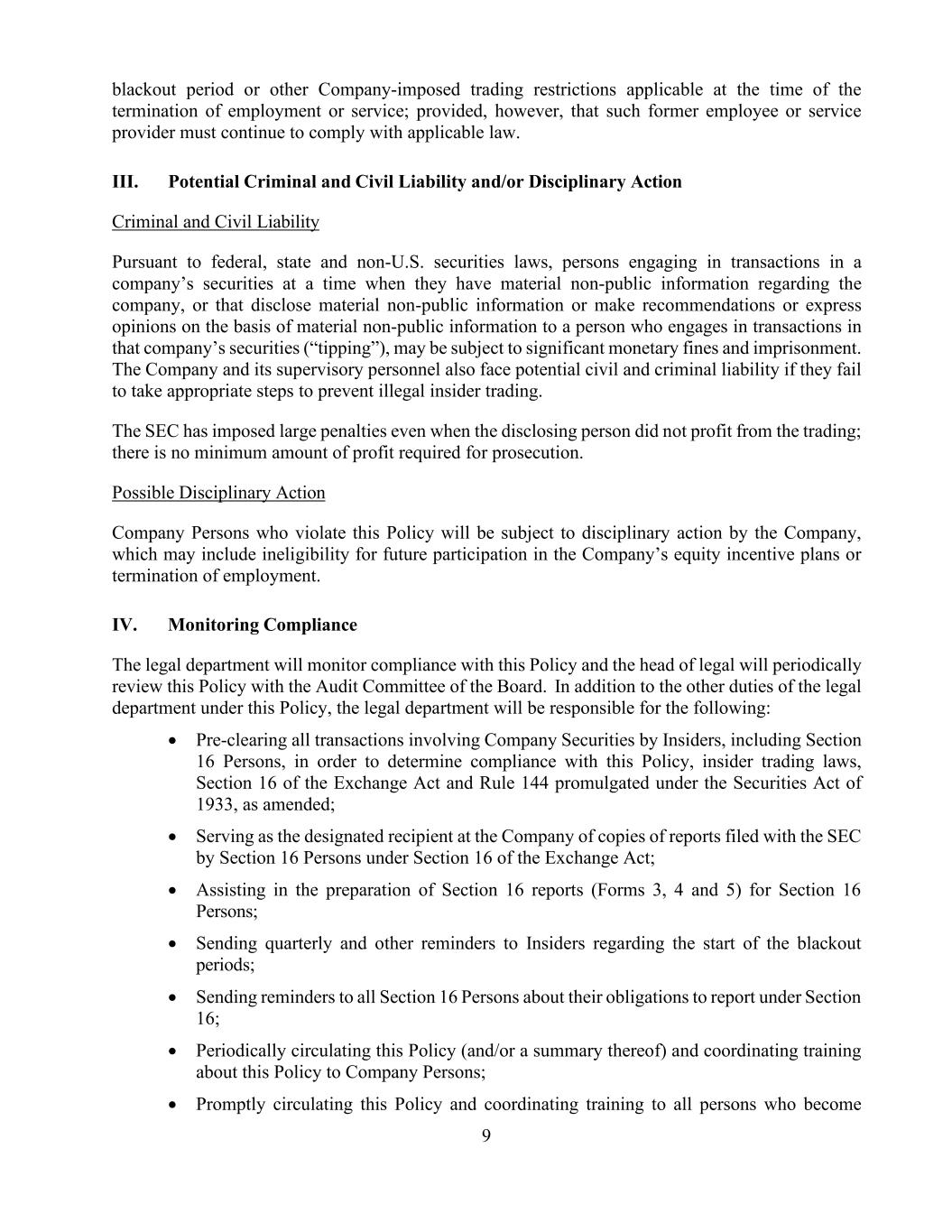
9 blackout period or other Company-imposed trading restrictions applicable at the time of the termination of employment or service; provided, however, that such former employee or service provider must continue to comply with applicable law. III. Potential Criminal and Civil Liability and/or Disciplinary Action Criminal and Civil Liability Pursuant to federal, state and non-U.S. securities laws, persons engaging in transactions in a company’s securities at a time when they have material non-public information regarding the company, or that disclose material non-public information or make recommendations or express opinions on the basis of material non-public information to a person who engages in transactions in that company’s securities (“tipping”), may be subject to significant monetary fines and imprisonment. The Company and its supervisory personnel also face potential civil and criminal liability if they fail to take appropriate steps to prevent illegal insider trading. The SEC has imposed large penalties even when the disclosing person did not profit from the trading; there is no minimum amount of profit required for prosecution. Possible Disciplinary Action Company Persons who violate this Policy will be subject to disciplinary action by the Company, which may include ineligibility for future participation in the Company’s equity incentive plans or termination of employment. IV. Monitoring Compliance The legal department will monitor compliance with this Policy and the head of legal will periodically review this Policy with the Audit Committee of the Board. In addition to the other duties of the legal department under this Policy, the legal department will be responsible for the following: • Pre-clearing all transactions involving Company Securities by Insiders, including Section 16 Persons, in order to determine compliance with this Policy, insider trading laws, Section 16 of the Exchange Act and Rule 144 promulgated under the Securities Act of 1933, as amended; • Serving as the designated recipient at the Company of copies of reports filed with the SEC by Section 16 Persons under Section 16 of the Exchange Act; • Assisting in the preparation of Section 16 reports (Forms 3, 4 and 5) for Section 16 Persons; • Sending quarterly and other reminders to Insiders regarding the start of the blackout periods; • Sending reminders to all Section 16 Persons about their obligations to report under Section 16; • Periodically circulating this Policy (and/or a summary thereof) and coordinating training about this Policy to Company Persons; • Promptly circulating this Policy and coordinating training to all persons who become
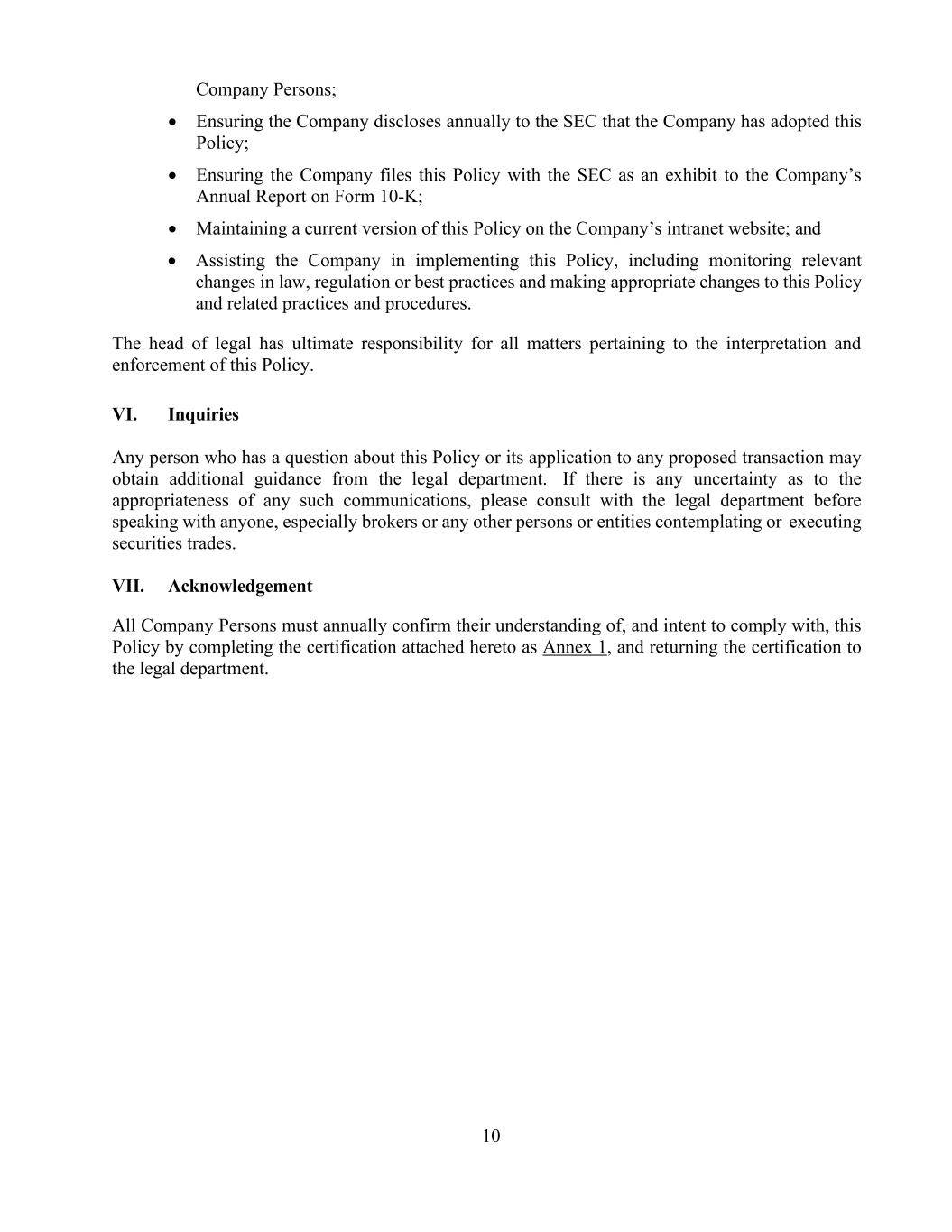
10 Company Persons; • Ensuring the Company discloses annually to the SEC that the Company has adopted this Policy; • Ensuring the Company files this Policy with the SEC as an exhibit to the Company’s Annual Report on Form 10-K; • Maintaining a current version of this Policy on the Company’s intranet website; and • Assisting the Company in implementing this Policy, including monitoring relevant changes in law, regulation or best practices and making appropriate changes to this Policy and related practices and procedures. The head of legal has ultimate responsibility for all matters pertaining to the interpretation and enforcement of this Policy. VI. Inquiries Any person who has a question about this Policy or its application to any proposed transaction may obtain additional guidance from the legal department. If there is any uncertainty as to the appropriateness of any such communications, please consult with the legal department before speaking with anyone, especially brokers or any other persons or entities contemplating or executing securities trades. VII. Acknowledgement All Company Persons must annually confirm their understanding of, and intent to comply with, this Policy by completing the certification attached hereto as Annex 1, and returning the certification to the legal department.
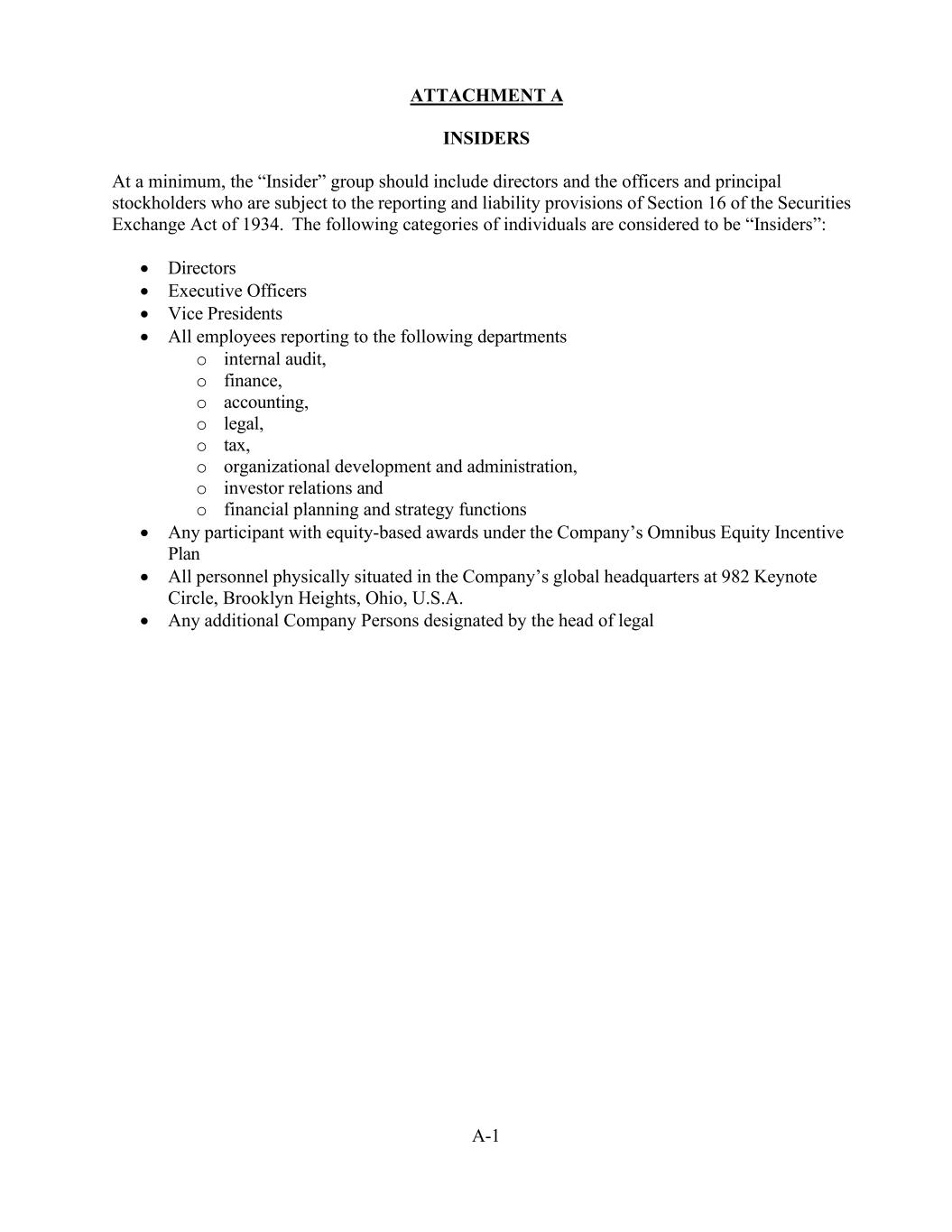
A-1 ATTACHMENT A INSIDERS At a minimum, the “Insider” group should include directors and the officers and principal stockholders who are subject to the reporting and liability provisions of Section 16 of the Securities Exchange Act of 1934. The following categories of individuals are considered to be “Insiders”: • Directors • Executive Officers • Vice Presidents • All employees reporting to the following departments o internal audit, o finance, o accounting, o legal, o tax, o organizational development and administration, o investor relations and o financial planning and strategy functions • Any participant with equity-based awards under the Company’s Omnibus Equity Incentive Plan • All personnel physically situated in the Company’s global headquarters at 982 Keynote Circle, Brooklyn Heights, Ohio, U.S.A. • Any additional Company Persons designated by the head of legal
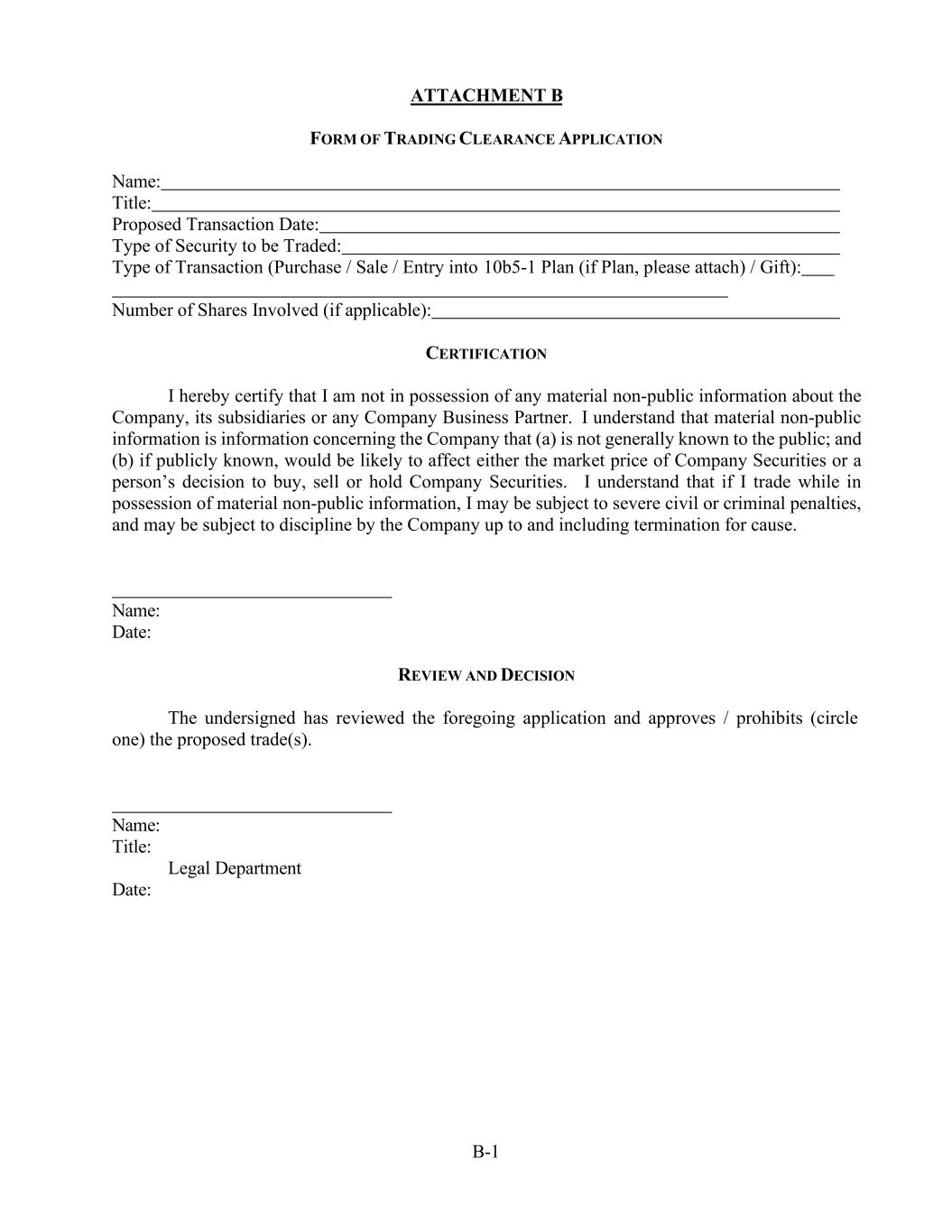
B-1 ATTACHMENT B FORM OF TRADING CLEARANCE APPLICATION Name: Title: Proposed Transaction Date: Type of Security to be Traded: Type of Transaction (Purchase / Sale / Entry into 10b5-1 Plan (if Plan, please attach) / Gift): Number of Shares Involved (if applicable): CERTIFICATION I hereby certify that I am not in possession of any material non-public information about the Company, its subsidiaries or any Company Business Partner. I understand that material non-public information is information concerning the Company that (a) is not generally known to the public; and (b) if publicly known, would be likely to affect either the market price of Company Securities or a person’s decision to buy, sell or hold Company Securities. I understand that if I trade while in possession of material non-public information, I may be subject to severe civil or criminal penalties, and may be subject to discipline by the Company up to and including termination for cause. Name: Date: REVIEW AND DECISION The undersigned has reviewed the foregoing application and approves / prohibits (circle one) the proposed trade(s). Name: Title: Date: Legal Department

Annex 1-1 ANNEX 1 GRAFTECH INTERNATIONAL LTD. Insider Trading Policy Acknowledgment and Consent The undersigned hereby acknowledges that he or she has received and reviewed a copy of the Insider Trading Policy (the “Policy”) of GrafTech International Ltd. (the “Company”), effective as of July 24, 2024, as adopted by the Audit Committee of the Company’s Board of Directors. Pursuant to such Policy, the undersigned hereby: • acknowledges and consents to the Policy; • acknowledges and consents to be bound by the terms of the Policy; • agrees to fully cooperate with the Company in connection with any of the undersigned’s obligations to the Company pursuant to the Policy; and • agrees that the Company may enforce its rights under the Policy through any and all reasonable means permitted under applicable law as the Company deems necessary or desirable under the Policy. ACKNOWLEDGED AND AGREED: Name: ________________________________ Date:

ANNEX 2 Annex 2-1 TRANSACTIONS UNDER RULE 10B5-1 PLANS Implementation of a trading plan under Rule 10b5-1 under the Securities Exchange Act of 1934, as amended, allows a person to place a standing order with a broker to purchase or sell stock of the Company, so long as the plan specifies the dates, prices and amounts of the planned trades or establishes a formula for those purposes. Trades executed pursuant to a Rule 10b5-1 plan that meets the requirements listed below may generally be executed even though the person who established the plan may be in possession of material non-public information at the time of the trade. A trading plan may be only established when a person is not in possession of material non-public information and when a blackout period is not in effect. Persons subject to this Policy are permitted to enter into Rule 10b5-1 plans after first submitting the trading plan to the legal department for prior, written approval. Subsequent modifications to any Rule 10b5-1 plan must also be pre-approved by the legal department. Rule 10b5-1 plans and subsequent modifications thereto must be submitted to the head of legal with a reasonable amount of time to review and ensure the plan is compliant prior to the intended execution date. Whether or not pre-approval will be granted will depend on all the facts and circumstances at the time, but the following guidelines should be kept in mind: • The trading plan must be in writing and entered into only when a blackout period is not in effect and when the individual is not in possession of material non-public information; • The trading plan must meet the requirements of Rule 10b5-1, including the certification requirements; • For a Director, the trading plan is subject to the terms of the Company’s Non-Employee Director Stock Ownership Policy and for certain of the executive officers, the trading plan is subject to the terms of the Company’s Named Executive Officer Stock Ownership Policy; • The trading plan must be adopted in good faith and not as part of a plan or scheme to evade the anti-fraud rules under the federal securities laws; • Once the trading plan is adopted, the individual must not exercise any influence over execution of transactions under the trading plan, such as the number of securities to be traded, the price at which they are to be traded or the date of the trade; • Subject to limited exceptions permitted by law, the individual may not have more than one trading plan in effect at any given time, and no transactions may be effected outside the plan while it remains in effect; • Transactions under the trading plan executed by a Director or executive officer may not commence until the later of 90 days have elapsed from the execution of the plan and two business days after filing of the periodic report covering the fiscal quarter in which the plan was executed, but in no event may such cooling off period exceed 120 days; • The trading plan should, in the absence of special circumstances, be for a period of not less than one year; • The trading plan should provide for relatively simple pricing parameters (e.g., limit orders), rather than complex formulae for determining when trading under the plan may occur and at what price; • The trading plan may generally not be terminated or amended once it is executed to avoid

Annex 2-2 calling into question the original “bona fides” of the plan; any amendment must be made only during a non-blackout period when the person is not in possession of material non- public information and transactions under the amended plan may not commence until the later of 90 days have elapsed from the execution of the amendment and two business days after filing of the periodic report covering the fiscal quarter in which the plan was executed, but in no event may such cooling off period exceed 120 days; • Trading plans do not obviate the need to file Form 144 or Forms 3, 4 or 5 and the fact that a reported transaction was made or is to be made pursuant to a trading plan should be noted on the applicable Form; and • A copy of the executed version of any pre-cleared trading plan must be provided to the legal department for retention in accordance with the Company’s Record Retention Policy.














